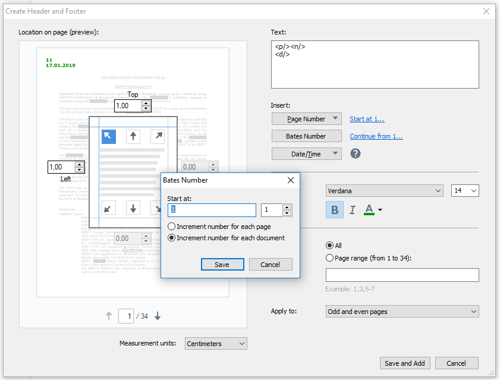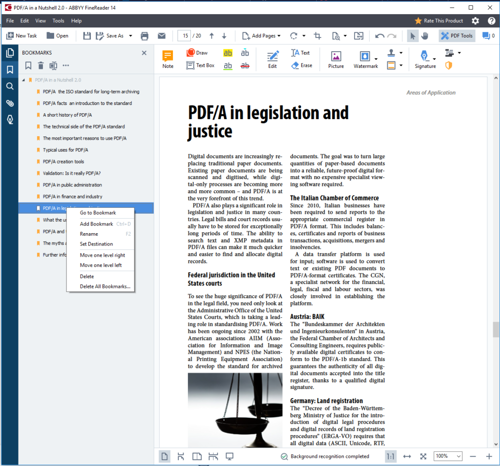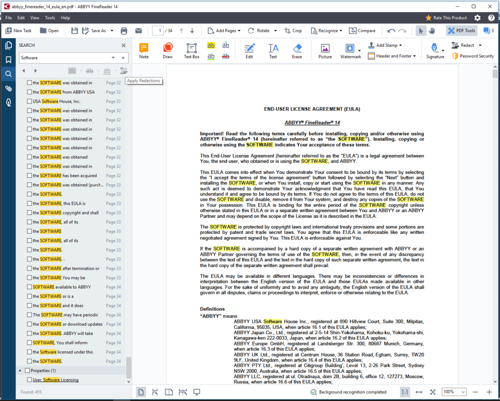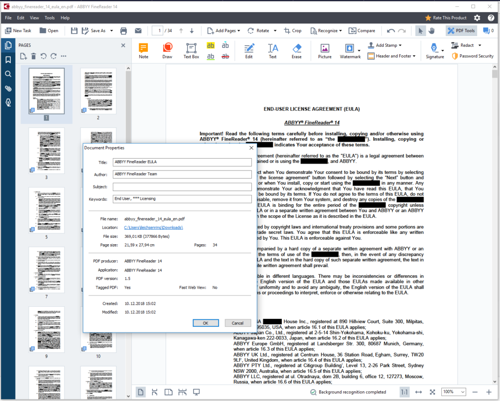As in most professional fields, PDF is the format of choice for digital documents in legal departments and law firms. However, the legal sector has some specific requirements regarding the work with this type of documents. With ABBYY FineReader you have a tool, which can handle the needs of your legal document tasks and additionally makes your paper documents digitally accessible.
Collaborate on legal documents
In ABBYY’s in-house legal department, FineReader is much appreciated throughout the whole lifecycle of a document. First, when legal documents are discussed, FineReader’s commenting tools prove very useful for the collaboration between the involved parties. When more excessive editing is necessary, FineReader can convert the PDF document to an editable Word file. Here, the change tracking keeps the editing process more transparent.
When the contract is finished and ready to be signed, our legal department utilizes another useful tool in FineReader: the document comparison. With this tool, contracts can be checked against earlier versions to prevent undesired and, sometimes, otherwise undiscovered changes. A good thing is, that FineReader can not only compare PDF documents, but also other digital formats including the scanned version of the signed paper contract.
Create “court friendly” PDFs
Sometimes despite all of the due diligence, cases have to go to court. In many countries, including the US, the PDF format is either required by law, or is the preferred format for records. Preparing those PDF records requires special tools. First, documents for the records must be collected. FineReader can combine PDFs with other documents for example in various Office formats and covert them to PDF with just a few simple clicks. Even paper documents can be included. By using OCR (Optical Character Recognition) FineReader can make sure, those scanned documents are editable and searchable.
Once the record is combined, the attorney or paralegal can add Bates numbers in FineReader to complete the file. Additional bookmarks can help emphasize the relevant legal points in the record and make important parts easily accessible.

Bates numbers can easily be added throughout the document.

Bookmarks help to structure documents (here an excerpt from "PDF/A in an Nutshell").
Redaction makes sure to remove sensitive information from documents. FineReader not just blackens out the text but actually replaces it with a black bar, thereby deleting it permanently. Using proper redaction tools may prevent unintentionally disclosing information, as repeatedly reported by industry specialists. FineReader’s redaction is not only reliable but also convenient: for example, a name used throughout the documents, can be searched and redacted in all occurrences with one click. FineReader even finds the search phrase in the document metadata and replaces it by *. Another possibility for preventing unintentional disclosure of information is to clean, or “sanitize” documents in FineReader by removing all “hidden” data such as metadata, attachments and comments completely.

Search and redact all search results in one go.

Text and Metadata can be removed permanently.
eDiscovery
In the process of preparation for eDiscovery you can bring all sorts of documents into a consistent format using FineReader. It converts different types of documents and even scanned paper into PDF files, which can be searched by keywords. By comparing documents, duplicates can be eliminated. Setting up so-called “hot folders” or “watched folders” with FineReader can automate the conversion of multiple paper documents and make eDiscovery within smaller cases and smaller law firms efficient and less resource intensive, without investing in expensive eDiscovery software. For making large amounts of documents searchable, an investment in a robust, server-based document conversion tool may be appropriate – ABBYY FineReader Server may prove just right for that task.
Keep your records
Once legal proceedings are finished, you need to keep your records accessible for quite a long time. FineReader can convert all files into PDF/A, an ISO standard for long-term archiving of digital documents. Since its publication in 2005, PDF/A has become the format of choice for archiving digital documents. It also plays a significant role in legislation and justice in many countries. Legal bills and court records usually have to be stored for exceptionally long periods; therefore courts often require records to be handed as PDF/A files. When it comes to converting extremely large quantities of paper-based records into the reliable, future-proof digital PDF/A format again utilizing FineReader Server as a robust server-based application may come in handy.
FineReader understands Legalese
FineReader offers law offices and legal departments all the tools for PDF editing and collaboration – and combines this with ABBYY’s renowned OCR. This means not only PDF and Microsoft® Office files but also paper documents can be included in the digital transformation of legal content. Moreover, in case there is too much of a paper trail, there is always FineReader Server, which can batch digitize even the most excessive paper archives and make them accessible.



